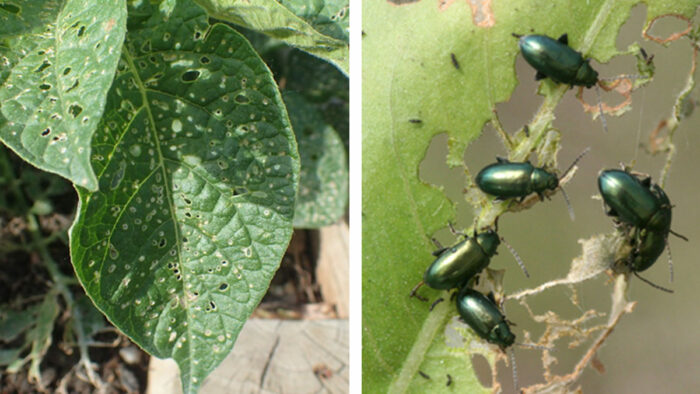
Late spring sees me watching and waiting, breath not quite bated—and certainly not baited—to find out my fate for the season with one garden critter in particular: the flea beetle. If these tiny, glossy beetles are set to make an appearance, they will typically begin to do so sometime between May and June.
Do you have flea beetles? How to recognize this pest in the garden
Generally, the first to arrive in my gardens are apple blossom flea beetles, which are just under half an inch long and colored a stunning, metallic green. They show up in droves in a day or two, almost as if having fallen from the sky (some flea beetles actually do this), and begin a fairly prodigal, coordinated campaign against all members of the evening primrose family (including the genera Oenothera, Calylophus, and plants formerly called Gaura) led by their tiny, chewing mouthparts. Damage from flea beetles is very distinct, appearing as small “shot holes” all over plant leaves. Some holes pass all the way through the leaf, while others are more superficial, but the look remains distinct. As summer heat approaches, these apple blossom flea beetles seem to disappear almost as fast as they appeared.
Three waves of flea beetles to watch for
In particularly unlucky years, my garden receives a shower of apple blossom flea beetles and a wave of two other flea beetles not so deterred by heat: one that nibbles on brassicas (broccoli, kale, cabbage, etc.) and one that enjoys solanaceous crops (tomatoes, potatoes, etc.). At a glance, both of these insects have a similar appearance, being minute, oblong to round, glossy black beetles with club-like antennae. They feed and behave similarly on your crops too, flying away as you work in the patch and leaving behind their distinctive shot-hole feeding patterns. This can make them quite irritating, as they can make leafy greens stronger tasting and unappetizing visually, but there is virtually no hope of handpicking the buggers to get rid of them. Generally speaking, flea beetles rarely do significant harm to most food crops, but can reduce yields and increase plant stress.
Tips for preventing flea beetles
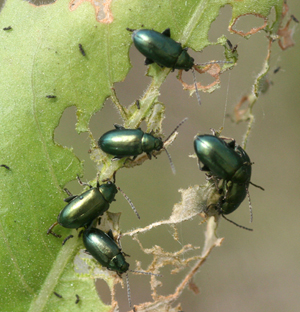
In most years I do nothing, letting the flea beetles wash, hop, and nibble over my garden as they please. After all, they’re naturally part of my garden’s ecosystem, and I figure they are probably a great food source for some bigger garden critters that I do enjoy seeing around. Typically my Oenothera releaf in a few weeks after the apple blossom flea beetles disappear, and the other types typically don’t appear in numbers that cause problems for my vegetable gardens. In the case of brassica flea beetles too, avoiding a spring crop of brassicas will significantly cut their numbers. And for most types, removing crop debris from your gardens can help somewhat with most flea beetle types, as many feed on crop roots or hide in crop debris for at least part of their lifecycle. This won’t eliminate the beetles, though, which easily come in from less fastidious gardens and wild spaces and can travel great distances on air currents.
How to manage flea beetles naturally
Having some management tricks for those rare years when it’s clear that flea beetles will cause problems for my crops is key. These days, my preferred management tactic also happens to whip up a prime “crazy gardener” scene for my neighbors: 6 a.m. sees me dragging a cordless vacuum through the garden. I then, probably to the amusement (but possibly the annoyance) of my neighbors, vacuum my plants.
This is a trick taught to me by a former coworker; I laughed until I tried it. The trick, to my amusement, was easier and faster than using an insecticide, and just as effective. If you think you’ll bother the neighbors, wait for a cool day so you can start a bit later; as long as temperatures are below 50°F or so, the flea beetles move slowly. Just don’t forget to add a bit of rubbing alcohol to the vacuum’s reservoir, or you’ll unleash a flea beetle cloud when you try to dump the canister.
Flea beetles aren’t easy to manage with insecticides
Once they are warmed up, flea beetles are such strong fliers that they can make their way into atmospheric currents. Whitney Cranshaw, retired entomologist for Colorado State University, recently reminded me that flea beetles were the insects he caught the most of while sampling for insects at 2,000 feet by plane. When they pull this epic stunt off, the buggers can literally rain down in a few waves on your garden as they fall out of the sky. So the vacuum trick appeals here too, as keeping flea beetles at bay in a bad year without my trusty garden vacuum would require repeated insecticide applications. Being highly mobile, flea beetles are one of relatively few garden pests or pathogens that aren’t evaded with a crop rotation either. Thankfully for my relationship with my neighbors, however, they’re rarely bad enough to need any active management. Should you have a problem with them, consider yourself armed with the knowledge to take care of the problem, assuming you’re willing to risk your dignity!
Look out for these other pests in the Mountain West:
How to Get Rid of Japanese Beetles
Pest Control for the Mountain West: Ips Beetles
For more Mountain West regional reports, click here.
Bryan Fischer lives and gardens at the intersection of the Great Plains and the Rockies. He is a horticulturist and the curator of plant collections for a local botanic garden.
Photos except where noted: Bryan Fischer


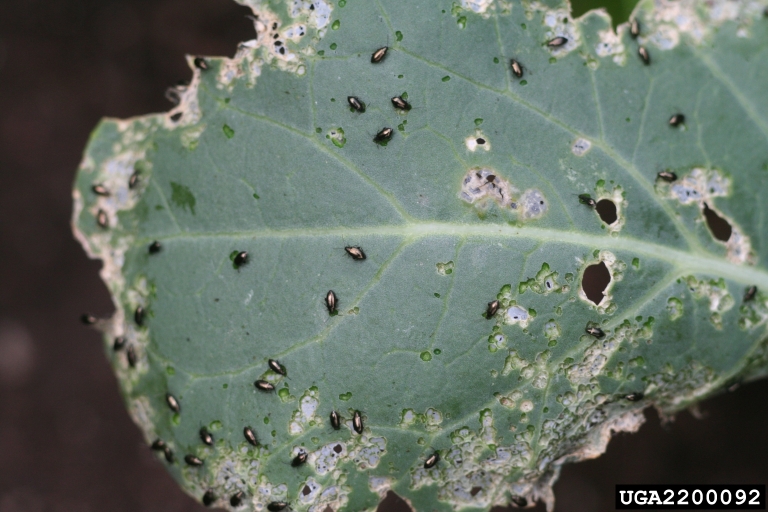
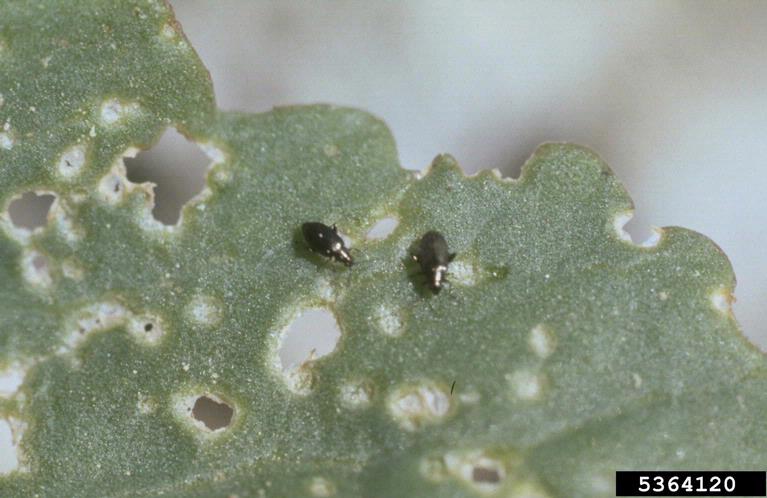


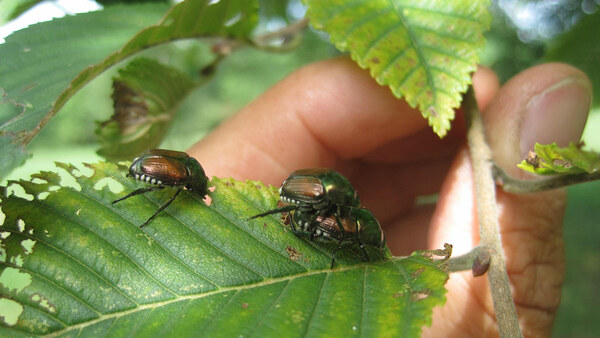
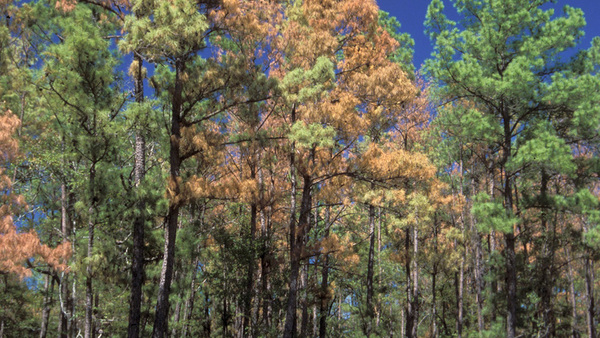
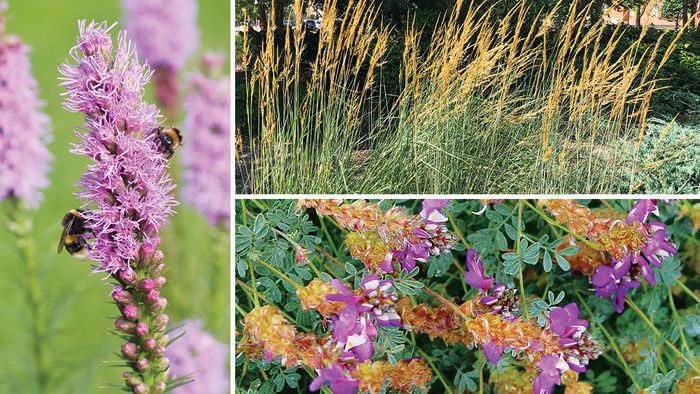
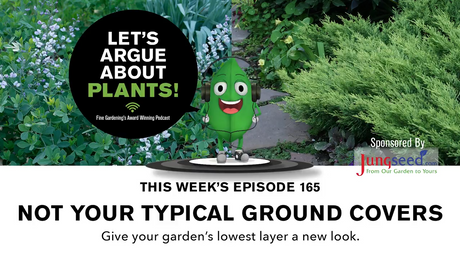
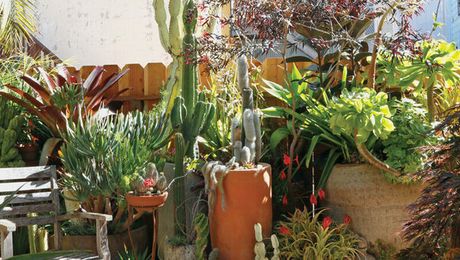









Comments
Log in or create an account to post a comment.
Sign up Log in